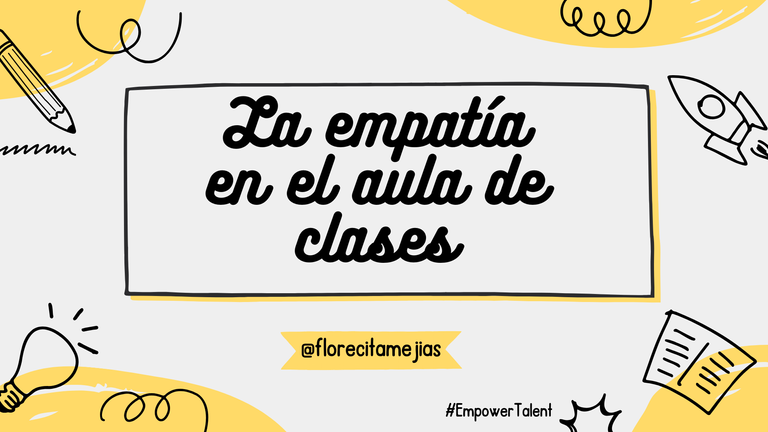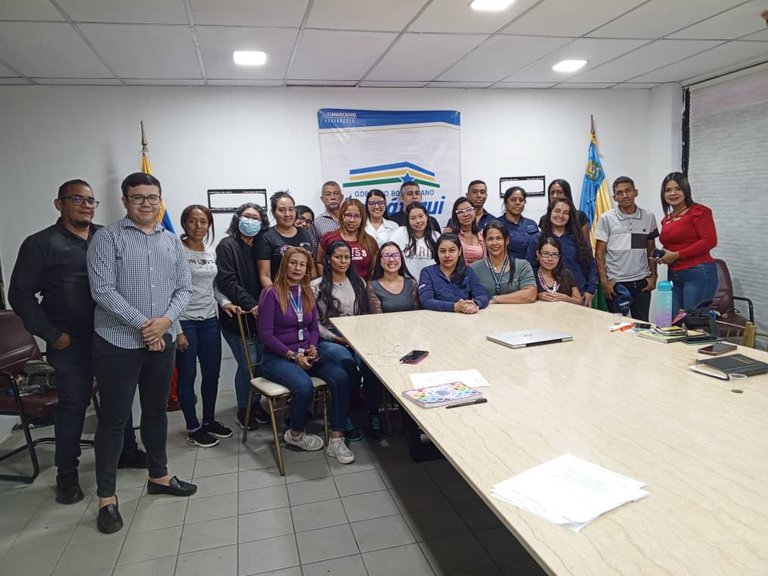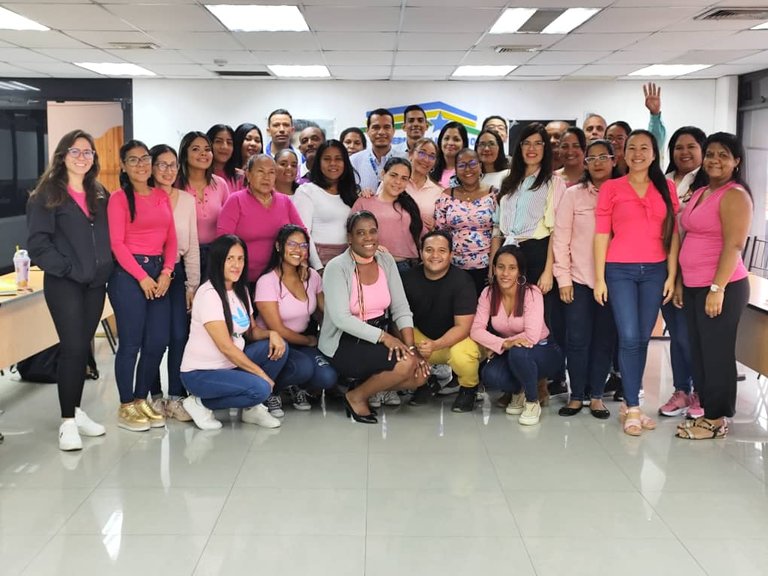Empathy in the classroom // La empatía en el aula de clases
Hello my dear talented ones! I hope your whole week is full of love and resolutions to fulfill all that your heart longs for💐.
I join the community proposal, talking about empathy and how I discovered it to apply it in the classroom.
¡Hola mis queridos talentosos! Espero que toda su semana esté cargada de amor y propósitos para que se cumpla todo lo que anhela su corazón💐. Me uno a la propuesta de la comunidad, hablando de la empatía y cómo la descubrí para aplicarla en el aula de clases.

I begin by saying that I was an "I" person, a person of "me with me"; that is to say, if I can do it, if I have overcome, if I have it, if you can't do it, it's your problem and your responsibility.
An example of this is that I was annoyed by someone who had no studies or who said things like "I didn't have the opportunity"; that's when my egoism came out and I said: don't let him come and tell me he didn't have the opportunity because if I did it, anyone can do it.
I can now recognise that beyond pride, I was not giving proper recognition to my achievements, but that is another matter.
To make a long story short, I happened to be a teacher and BANG! there I came face to face with empathy, so I had to learn (because I had to be in that place) to recognise the emotions of others and put myself in their place to understand them.
The first mistake I made was to follow traditional education models where: the teacher is right, knowledge is evaluated, there is no empathy with the student, in other words, this is what I say and that's it.
In the society we live in, with the different educational deficiencies and weaknesses, I realised that most people, despite the adversities, were there for only one reason: to learn and continue to grow in our country, which is so hurt and fractured.
Comienzo diciendo que yo era una persona yoista, del yo con yo; es decir, si yo puedo hacerlo, si yo me superé, si yo lo tengo, el que tú no lo logres es tu problema y tu responsabilidad. Un ejemplo de ello es que, me molestaba alguien sin estudios o que dijera cosas como "no tuve la oportunidad"; allí salía mi yoismo y decía: a mi que no me venga a decir que no tuvo oportunidades porque si yo lo hice, cualquiera puede hacerlo. Ya puedo reconocer que mas allá de la soberbia, no le estaba dando el reconocimiento adecuado a mis logros, pero ya ese es otro tema. Para hacer el cuento corto, resulta que me toca ser profesora y ¡PUM! allí me topé de frente con la empatía por lo que me tocó aprender (porque debía estar en ese lugar) a reconocer las emociones de los demás y ponerme en su lugar para comprenderlo.
El primer error que cometí es seguir modelos de educación tradicional donde: el profesor tiene la razón, se evalúa conocimiento, no se empatiza con el alumno, es decir, esto es como yo digo y ya. En la sociedad que vivimos, con las diferentes carencias y debilidades educativas, me dí cuenta que la mayoría de las personas a pesar de las adversidades, estaban allí por una sola razón: aprender y seguir creciendo en nuestro país que bien dolido y fracturado está.

This revelation led me to adapt, which has totally changed my way of acting in certain situations. I have had to give training in places with no ventilation (air conditioning), for a few hours, with people who sometimes don't even bring food, or the classrooms are not in good conditions because they don't even have projection equipment or blackboards. Despite these adversities, it does not diminish the quality of teaching that they deserve, because the country's situation simply does not allow us to afford certain luxuries or comforts in order to be able to intervene and teach certain subjects.
Most people often don't even know why they are there, and it is my job to "make them fall in love", "persuade them", "conquer them" so that they stay with the elements I have in my favour, in order to allow them the opportunity to grow and take some of the knowledge imparted to them.
Being empathetic, it has also allowed me to adapt to the evaluation processes so that not everything is writing, seeing or nodding; I take them to elaborate, investigate, analyse, talk from their experiences, obtaining better results than a grade. For example, my oldest student was an 80 year old man, what did I have for him? How did I "fall in love" with him? The fact is that he listened to my whole class (between his moments of lucidity) and it was time to talk about correspondence; well, this man, from his experience, gave us a MAGISTRAL class! From the telegram, the postcards and the post office that took all the credit from the other pupils (and me) for the way their knowledge was put into practice. I was very happy that day😊.
I tell you that not everything has been so easy, so I tell you the other side of the coin; there are people who refuse to learn and grow, that is a fact. They are these difficult learners, saboteurs, disrupters of the class. If I were not empathetic, my first command would be "get out of my class", but before that decision, I allow myself to find out what might be bothering them; at the beginning, they are those jokers, who even in their non-verbal language show their resistance to learning. As the hours go by, I can tell whether I have won them over or not, and this is evident if they come back the next day or if they withdraw on their own, it is their choice.
Esta revelación, me llevó a la adaptación por lo que me ha cambiado totalmente mi forma de actuar ante ciertas situaciones. Me ha tocado dictar formaciones en sitios sin ventilación (aire acondicionado), por pocas horas, con personas que a veces ni comida llevan, o los salones no estan en condiciones ya que ni equipos de proyección o pizarrones tienen. A pesar de estas adversidades, no disminuye la calidad de enseñanza que ellos merecen, porque simplemente la situación país, no permite darnos ciertos lujos o comodidades para poder intervenir y enseñar ciertas materias. La mayoría de las personas, muchas veces ni saben porque estan allí, y es mi trabajo "enamorarlos", "persuadirlos", "conquistarlos" para que se queden con los elementos que tengo a mi favor, para poder permitirles la oportunidad de crecer y llevarse algo del conocimiento impartido.
Al ser empática, también me ha permitido adaptarme a los procesos evaluativos por lo que no todo es escribir, ver o asentir con la cabeza; los llevo a elaborar, investigar, analizar, hablar desde sus experiencias, obteniendo mejores resultados que una nota. Por ejemplo, mi alumno más longevo fue un señor de 80 años ¿Qué tenía para él? ¿Cómo lo "enamoraba"? El caso es que escuchó toda mi clase (entre sus momentos de lucidez) y tocó hablar de la correspondencia; Bueno, ese señor, desde su experiencia nos dio una clase ¡MAGISTRAL! Del telegrama, las postales y la oficina de correspondencia que se llevó todo el mérito de los demás alumnos (y el mío) de la forma como su conocimiento lo llevó a la práctica. Ese día fui muy feliz😊. Les cuento que no todo ha sido tan fácil, por lo que le cuento la otra cara de la moneda; existen personas negadas a aprender y crecer, eso es un hecho. Son estos alumnos díficiles, saboteadores, interruptores de la clase. Si no fuera empática, mi primer mandato sería "fuera de mi clase", pero antes de esa decisión, me permito indagar que le puede molestar; al inicio, son aquellos bromistas, que hasta en su lenguaje no verbal se le nota la resistencia a aprender. Al pasar las horas, ya puedo decir si me los he ganado o no y esto se evidencia si al otro día vuelven o se retiran solitos, es su elección.

I practice empathy every day; from the moment I leave my house and even in my own home, as well as virtually and in all the scenarios that present themselves to me, although my primitive reaction is defensive or attacking, once I come to my senses, I always try to put myself in the feet of others and give a response accordingly.
The important thing about empathy is not to confuse it with the weakness or complicity of saying YES to everything, to whatever that person wants to hear. It has to do with the ability to connect emotionally with the needs and shortcomings of people in order to understand their behaviour and reactions to certain situations, which perhaps we, as we have not been through them, do not understand. Nor is it to take on the other person's problem, but to understand it from their emotions in order to help them find a solution.
Empathy is also knowing how to keep quiet when there is nothing to say or even a lot to say in situations that we may regret. This quality is very nice to practice and to assume that all human beings are different, but moved by the same emotional connection.
La empatía la practico todos los días; desde que salgo de mi casa y hasta en mi propio hogar, así como de manera virtual y en todos los escenarios que se me presenten, aunque mi reacción primitiva sea la defensiva o el ataque, una vez que entro en razón, intento siempre colocarme en los pies de los demás y de acuerdo a ello dar una respuesta.
Lo importante de la empatía es no confundirla con la debilidad o complicidad de decir a todo SI, a lo que quiere escuchar esa persona. Tiene que ver con la capacidad de conectar emocionalmente con las necesidades y carencias de las personas para entender sus comportamientos y reacciones ante ciertas situaciones, que quizás nosotros como no hemos pasado por ellas, no la entendemos. Tampoco, es cargarse con el problema del otro, sino entenderlo desde su emoción para poder ayudarle a encontrar una solución. Empatía es también saber callar cuando no hay nada que decir o pero aún mucho que decir en situaciones que podamos arrepentirnos. Esta cualidad es muy bonito practicarla y asumir que todos los seres humanos somos diferentes, pero movidos por una misma conexión emocional.

Thank you my @angelica07 for allowing us this wonderful space to talk about empowerment through our actions and skills in any area of our daily lives.
The photographs are part of my digital archive in some formative processes. The cover was made in Canvas. The dividers in FotoJet.
See you next time.
Gracias mi @angelica07 y a todo el equipo por permitirnos este maravilloso espacio para hablar desde el empoderamiento a traves de nuestras acciones y habilidades en cualquier ámbito de nuestra vida diaria. Las fotografías forman parte de mi archivo digital en algunos procesos formativos. La portada la hice en Canvas. Los separadores en FotoJet. Hasta un próximo encuentro.

0
0
0.000
Hola bella @florecitamejias, que hermoso post.
Que hermoso es el que podamos reconocer nuestras acciones y detenernos a pensar y recapacitar nuestra actitud ante algún evento. Pero, más importante es la hermosa soialización,apoyo, solidaridad que prestas a tus alumnos.
Todos los días aprendemos cosas nuevas y de personas con mucha experienia extraordinaria, son un libro abierto que nutren nuestras vidas.
Deseo que sigas logrando ese feedback con tus alumnos, el ser emp<to es un valor hermoso en nuestras vidas.
Y como dices no se debe permitir el que la confundan con permisabilidad.
Si, me falta mucho aprender pero creo que voy por buen camino 😊. A veces, no es fácil pero trato de sobreponerme y quitar de mi pensamientos negativos y tomar lo mejor de cada quien.
Gracias por leer mi publciación y su valioso comentario. Un abrazo🤗.
Ese trabajo que realizas con tus estudiantes es invaluable, es una fortaleza poder ser empáticos en esos entornos.
Saludos cordiales.
Si, cuando se tienen mucha carencias la educación no es una prioridad así que debo "ganarme" ese público. Gracias por su valioso comentario🤗.